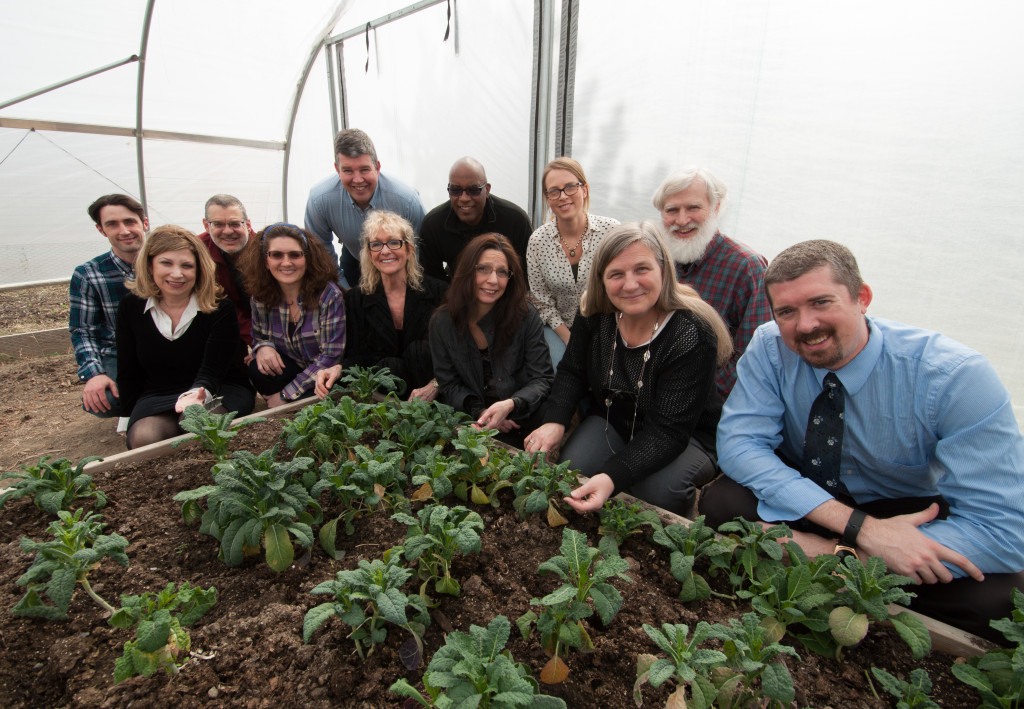Diverse group works to improve WCC campus environment, strives for zero carbon footprint

If ever there was an all-hands-on-deck team to solve a problem and embrace a movement, it’s Washtenaw Community College’s Sustainability Council.
The council is comprised of diverse working groups that meet regularly on campus representing areas of Food and Agriculture, Transportation, Buildings and Energy, Natural Resources, Zero Waste, Curriculum, Purchasing, Public Relations and Community Outreach.
Dale Petty, full-time faculty member in Industrial Electronics, used a 2009 sabbatical to rally support from across the campus to develop WCC’s Climate Action and Sustainability Plan (CASP) and rallied support from all campus departments.
Adopted by the college and signed by WCC President Dr. Rose B. Bellanca in April 2014, 2014, CASP is more than a document. It represents an active commitment by the college to achieve carbon neutrality—zero carbon footprint—by 2060.
“Every community has its own unique qualities, and no two models will operate the same,” Petty said. A college in sunny California, he noted, addresses its energy requirements through 25,000 solar panels.
Petty says that nearly every department on campus is actively collaborating to deliver on the long-term commitment of being a good steward of the environment.
“Sustainability can’t be generated from a single locus,” he said. “It has to be a collaboration from all parties, from the grassroots and from the treetops of the organization. I’m proud that at WCC we have consistently had committed presidents, students, faculty, office workers, maintenance workers, community members, and people from all across the college working together to create a sustainable future.”
With the pioneering efforts in environmental awareness of Dave Thomas, Geology instructor, and the ongoing leadership of Damon Flowers, vice presidents of Facilities, and his team the college’s carbon footprint has leveled off.
To reach the CASP goals set for 2060, a continued annual reduction of 2 percent in energy use is still needed.
Another project born of sheer interest and commitment to sustainability, the campus CORE Garden exists because of the efforts led by Counselor Kim Groce.
Some of the vegetables grown are given to students in need, while a Culinary Arts class grows vegetables that are used in Garrett’s, the student-operated restaurant.
With a grand opening on March 15, the WCC Seed Library became one of just five seed libraries in the state of Michigan.
Sandy McCarthy, Faculty Librarian and facilitator of the Food & Agriculture subgroup
of the Sustainability council, has welcomed the entire WCC community to participate
in the Seed Library.
Students, staff, and the public are welcome to browse the library of seeds for planting
at home.
Meantime, Petty continues to find new ways to weave sustainability into the fabric of the WCC community. He took another sabbatical in the fall of 2015 to develop a campus-wide curricula that supports sustainability.
As an engineer, he is the first to point out that sustainability success can benefit from everyone’s involvement, whether it be through writing and communications (in the English department), communications and marketing (in the Graphic Design Technology department), or better understanding fuel and emissions (in the Auto Services department).
“It’s really important to reach across the aisle and figure out what’s best for the country, not what’s best for me or my party, or whoever contributes to my campaign,” he said.
There are a lot of opportunities to support sustainability on campus, Petty said: “Find out what’s going on and get involved in way that aligns with your interests.”
For more information on the Sustainability Council and their activities on campus, visit sustainable.wccnet.edu.
By Jessica Bibbee
Public Relations Intern
